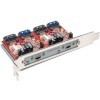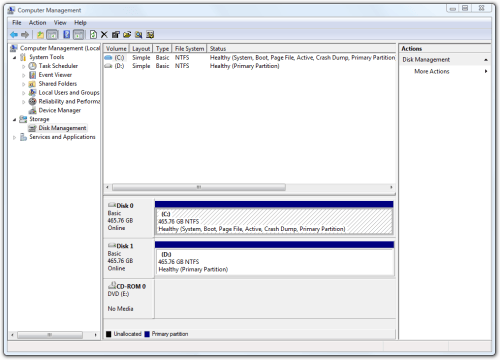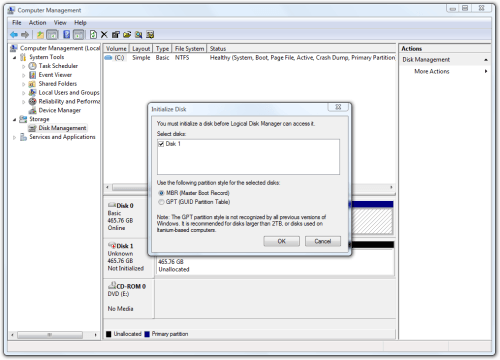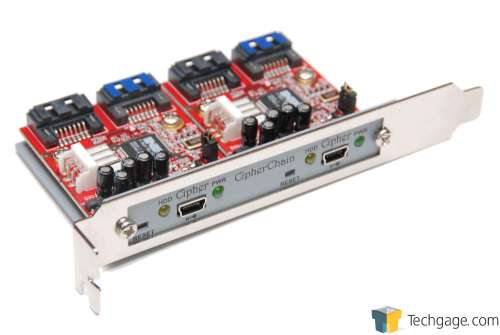- Qualcomm Launches Snapdragon 4 Gen 2 Mobile Platform
- AMD Launches Ryzen PRO 7000 Series Mobile & Desktop Platform
- Intel Launches Sleek Single-Slot Arc Pro A60 Workstation Graphics Card
- NVIDIA Announces Latest Ada Lovelace Additions: GeForce RTX 4060 Ti & RTX 4060
- Maxon Redshift With AMD Radeon GPU Rendering Support Now Available
Addonics CipherChain Hard Drive Encryption

We took a look last week at a thumb drive that offered unparalleled data security, and this time around, we’re taking a look at a similar product, but one that’s designed for PC use, whether in the office or at home. The CipherChain, from Addonics, is easy-to-install and operate, and secures your data using the ultra-secure AES 256-bit cipher.
Page 2 – Installation, Final Thoughts
Installing the CipherChain into a PC couldn’t be much more simple. If you purchased the PCI version of the product, that’s where it would install, and likewise with the other options. From there, a S-ATA cable must be plugged from the blue S-ATA port to the motherboard, and the black S-ATA port to the desired hard drive. Then, the 4-Pin Floppy connector must be connected to power the device, and once that’s done, the setup is complete.
The next step is to plug in the respective key to the CipherChain, and then boot up the machine. If data is on the drive, it can be accessed fine, but as soon as you push power, the encryption will take over, so on the next boot, if the key isn’t plugged in, “bye bye” data. So, it’s important to make sure the correct drive is connected, the first time.
When in Windows, or any other OS, you’ll be able to use the drive as normal, and it will appear just fine. As far as the OS is aware, there’s nothing fancy going on at all, so nothing at all will seem different. The CipherChain itself isn’t even seen by the PC, so there’s no worries about drivers or anything like that. It’s all-inclusive.
If no key is plugged into the device and the PC is boot up, the drive will be absolutely hidden from the rest of your PC. Nothing at all will be able to pick it up, so as far as the PC is concerned, it’s not there. If you remove the drive from the CipherChain and boot up normally, then the drive is of course found just fine, but, as you’ll notice in the below screenshot, it’s seen as being a completely fresh drive, even sans the partition table.
At this point, if the CipherChain and its key no longer exists, the data is gone, and the drive can be used as normal, so you’d be able to create the partition table and partition, and be on your way. If you remove a drive from the CipherChain and immediately boot up like is seen in the image above, the computer truly sees it as a brand-new and empty drive. If you run a recovery tool, such as TestDisk, R-Studio or Ontrack, the scan of the disk will come up completely blank. So, not only can someone not grab encrypted data, they can’t grab any at all.
Where on-the-fly encryption is concerned, slower performance can be a big issue. But with CipherChain, all of the data shares the same AES 256 encryption key, so the performance drop as a whole isn’t so much related to the encryption, but the fact that the data has to first go from your PC to the CipherChain, and then to your storage device, rather than straight from the PC to your storage device.
To see what kind of performance hit would result from adding one or two CipherChain’s, I ran HD Tune Pro on the effected Seagate Barracuda 7200.11 500GB while the drive wasn’t hooked up to the CipherChain, and also when it was, in both configurations.

Fortunately, the minimum speeds for both reads and writes didn’t change in the least, but as expected, the capped rate did. Without CipherChain, our drive peaked at 86.5MB/s read and 84.5MB/s write, and with one, those numbers dropped to 85.8MB/s and 82.5MB/s, respectively. Overall, these numbers aren’t worth avoiding the product for, because they’re very minor. The biggest drop is seen with the burst speed, which with one CipherChain, dropped to 61.6MB/s, from 88.6MB/s. Moving to two CipherChains didn’t make such a stark difference, fortunately.
I also quickly tested out SSD use, with an Intel X25-M G1. This drive is capable of a read speed of around 250MBs (it’s usually more like 230MB/s), but with the CipherChain, that dropped to 100MB/s. So, this product isn’t going to be as stellar for SSDs as hard drives, but I don’t see SSDs being that popular of a choice with CipherChain to begin with, so it’s a minor nick.
Final Thoughts
As someone who cares a lot about data and information security, I can’t help but love Addonics’ CipherChain. The biggest downside is that a single device and accessories costs $80, but that has no reason to be a huge deterrent to those who care a lot about keeping their data safe, because while a bit high, it’s certainly not out of this world.
Where the CipherChain shines is with its implementation. The device is small, and could be implemented really in any PC out there. You don’t even have to use one of Addonics’ mounts. If you wanted, you could make your own, or position the chip somewhere safe in your PC, with a little mod (making sure not to let the bottom of the device hit your chassis, of course).
The size is one plus, but another is the ease-of-use. Within ten minutes, or even less, of opening the box, you could be inside of your preferred OS with a truly secured drive at your disposal. It’s important to note, though, that Addonics doesn’t recommend using its CipherChain on the main OS drive, because if you lose a key, your PC will be inoperable… not to mention the slight performance hit. It instead recommends using it on a secondary drive, where all the important data would be kept secure.
One downside is the throttling of performance that our drive’s experienced. The differences between a drive with and without the CipherChain wasn’t enormous (it is on the SSD side), but it’s still worthy of consideration is performance is extremely important. If that’s the case, companies like Addonics offer even faster solutions, but they of course cost more as well.
Aside from the performance and the slightly-expensive price, there’s nothing I don’t like about the CipherChain. It’s simple to use, and you can be confident that your hard drive is completely secure when you’re not at the PC (assuming you didn’t leave the key in the CipherChain!).
Pros
- Your data couldn’t be much more secure than with the CipherChain.
- Easy-to-install… anyone could do it.
- The device is very tiny, so it can be installed pretty-well anywhere.
- Addonics offers free re-coding of keys (shipping not included).
- There’s a version for eSATA as well, if that better suits your needs.
- The CipherChain itself may be a bit expensive, but the accessories are not.
Cons
- Minor performance hit (primarily in max speeds).
- More expensive than some other solutions (mostly software).
Discuss this article in our forums!
Have a comment you wish to make on this article? Recommendations? Criticism? Feel free to head over to our related thread and put your words to our virtual paper! There is no requirement to register in order to respond to these threads, but it sure doesn’t hurt!
Support our efforts! With ad revenue at an all-time low for written websites, we're relying more than ever on reader support to help us continue putting so much effort into this type of content. You can support us by becoming a Patron, or by using our Amazon shopping affiliate links listed through our articles. Thanks for your support!








